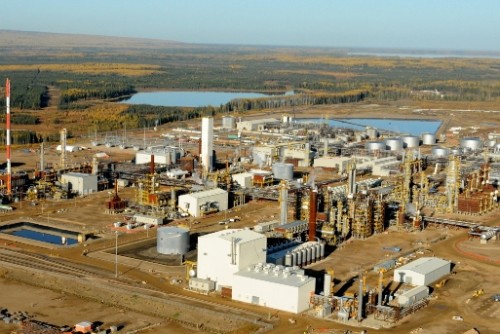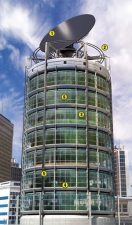 How can the polluting oil tar sand oil extraction – here Opti Canada’s operations – be better than offshore drilling?
How can the polluting oil tar sand oil extraction – here Opti Canada’s operations – be better than offshore drilling?
The Gulf of Mexico oil “leak” is a gusher pouring as much as 3.4 million gallons of oil into the waters every day, scientists estimate in a NY Times story. It’s below the surface what counts. The oil spreading underwater may result in much of this body of water becoming a “dead zone” or void of marine life. This slick could eventually spread into the Caribbean Sea as well as parts of the Atlantic Ocean as well. Government sources and BP have “estimated” something different – some 5,000 – 7,000 barrels of oil per day, that people are being led to believe is escaping in the Gulf.
Could this be one of the planet earth’s worse ecological disasters since creation that rivals the events that spelled the end of the era of the dinosaurs more than 40 million years ago? Finding alternatives, oil purveyors look to Canada’s oil-rich tar sands. But what could be unleashed there in terms of pollution could be worse than the Gulf oil spill.
The Gulf oil event has already made the US and other world governments think seriously about continuing to drill for oil and natural gas under the oceans and seas, which often have to be more than a mile deep before reaching the sea bed, and subject to thousands of tons of underwater pressure.
Finding alternatives to offshore well drilling has already resulted in searching for oil in what are known as oil tar sands, in places like Alberta Canada. These sands, are said to be the “last frontier” for extracting fossil fuels, and despite their own environmental problems are considered as less problematic than offshore oil wells. The environmental issues surrounding the extraction of crude oil from oil tar sands, has already been noted by myself and other Green Prophet writers in which large amounts of steam is sent underground to “free” the trapped oil and bring it to the surface.
The down side of this kind of oil production was also noted in an article in the UK newspaper, The Guardian, that reported on research from the NGO, Friends of the Earth; there are environmental ramifications of creating synthetic crude oil from bitumen deposits:
“Tar sands – bitumen that is extracted and upgraded to produce synthetic crude – has been heavily criticised for its poor environmental and social outcomes, locally and globally. Canada is currently the only major centre of production but investment is expanding, including by European oil companies such as BP, Shell, Total and ENI.”
What environmentalists are trying to tell people is that the main problem is Mankind’s continued desire to rely on fossil fuels as a major source of our energy needs – instead of trying to put more efforts into developing alternative and renewable energy sources.
Consider the Middle East, where a great deal of the earth’s remaining petroleum reserves are still located; this region also has huge solar energy potential since the sun shines here as much as 340 days a year. Even countries like Saudi Arabia are now beginning to develop solar energy to provide power for desalination plants and other industrial uses.
I shudder to think what could happen if a similar sized well blowout would occur in the eastern Mediterranean or in the Persian Gulf, which is still suffering from the effects of the largest man-made spill that occurred during the 1991 Gulf War.
In the end, the only way to prevent these oil spills, and environmental damage from tar sand oil extraction is to make more concerted efforts to developing alternative and renewable energy. And the sooner, the better.
(Photo above of tar sands via Opti-Canada Inc.)
Read articles dealing with oil tar sands and alternative energy:
Ormat Industries Involved in Alberta Tar Sands Crude Oil Project
Japan and Saudi Arabia Plan Large Plant to Manufacture Desalination Equipment
Ormat Taps into Thermal Volcanic Energy in Indonesia




I can already see that nobody gives a didly about this subject.
This is why were are all in the mess we are in now, environmental wise!